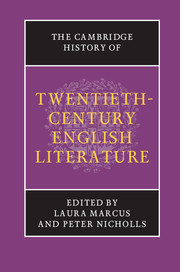Book contents
- Frontmatter
- Introduction
- PART ONE WRITING MODERNITY
- PART TWO THE EMERGING AVANT-GARDE
- PART THREE MODERNISM AND ITS AFTERMATH, 1918–1945
- 10 Trauma and war memory
- 11 The time–mind of the twenties
- 12 Modern life: fiction and satire
- 13 Modernist poetry and poetics
- 14 Modernity and myth
- 15 Psychoanalysis and literature
- 16 Biography and autobiography
- 17 ‘Speed, violence, women, America’: popular fictions
- 18 Theatre and drama between the wars
- 19 Literature and cinema
- 20 The thirties: politics, authority, perspective
- 21 Literary criticism and cultural politics
- 22 Surrealism in England
- 23 World War II: contested Europe
- 24 World War II: the city in ruins
- PART FOUR POST-WAR CULTURES, 1945–1970
- PART FIVE TOWARDS THE MILLENNIUM, 1970–2000
- Bibliography
- Index
- References
20 - The thirties: politics, authority, perspective
from PART THREE - MODERNISM AND ITS AFTERMATH, 1918–1945
Published online by Cambridge University Press: 28 March 2008
- Frontmatter
- Introduction
- PART ONE WRITING MODERNITY
- PART TWO THE EMERGING AVANT-GARDE
- PART THREE MODERNISM AND ITS AFTERMATH, 1918–1945
- 10 Trauma and war memory
- 11 The time–mind of the twenties
- 12 Modern life: fiction and satire
- 13 Modernist poetry and poetics
- 14 Modernity and myth
- 15 Psychoanalysis and literature
- 16 Biography and autobiography
- 17 ‘Speed, violence, women, America’: popular fictions
- 18 Theatre and drama between the wars
- 19 Literature and cinema
- 20 The thirties: politics, authority, perspective
- 21 Literary criticism and cultural politics
- 22 Surrealism in England
- 23 World War II: contested Europe
- 24 World War II: the city in ruins
- PART FOUR POST-WAR CULTURES, 1945–1970
- PART FIVE TOWARDS THE MILLENNIUM, 1970–2000
- Bibliography
- Index
- References
Summary
It is not uncommon to refer to various decades in the twentieth century as if they possessed a character of their own, displaying marks of identity not shared by the decades preceding or following them. The 1930s might seem from this point of view the most self-contained decade in the literary history of the last century, bounded on one side by the beginning of the Depression, and on the other by the outbreak of World War II. It is a period deeply marked by the misery of large-scale unemployment, by the rise of Fascism in Europe, and by the Spanish Civil War (1936–9), a conflict that effectively politicised a whole generation and saw the loss in combat of many of its members.
A surprising number of writers active in the 1930s were prepared to take up clear political positions, in a way and to a degree that has never been paralleled in Britain, before or since. When the pamphlet Authors Take Sides on the Spanish War was published in 1937, one hundred and twenty seven writers expressed support for the Republican side in the conflict, with five against, and only sixteen placing themselves in the ‘neutral’ category. Having a political position, and writing from it, was not just a common desideratum; for much of the decade it was felt to be an urgent necessity. Any reading of thirties’ literature has to attend to the problems that writers encountered in determining a position and perspective from which to speak.
- Type
- Chapter
- Information
- The Cambridge History of Twentieth-Century English Literature , pp. 359 - 378Publisher: Cambridge University PressPrint publication year: 2005

